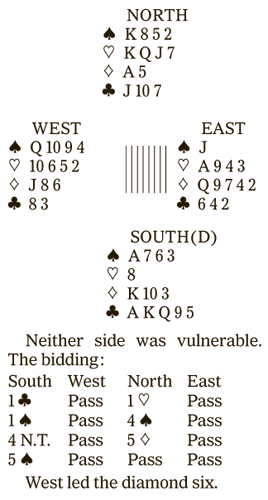The last paragraph of Saturday’s column generated a few queries. When is a 4-4 fit better than a 5-3, and vice versa?
The best analysis of trump fits was written by Albert H. Morehead, the original bridge columnist for The New York Times, in his excellent 1964 book, “Morehead on Bidding.”
Morehead gives three times when 4-4 is superior to 5-3:
1. A deal that requires one or more ruffing tricks to fulfill its contract.
2. A deal that has ample trick-winning power but a possible shortage of controls. Then you are usually gaining discards from the long side suit.
3. When both dummy and declarer have weak side suits that can be stopped only by ruffing.
Those cover most deals, but the 5-3 should be preferred on these rare occasions:
1. When the two hands have an abundance of winners in the other two suits.
2. When the 5-3 fit is very strong, the 4-4 fit is weak, and trumps losers are the main or only concern.
Morehead gives the diagramed deal as an example of this last point. It was played in a seven-table expert event. Three pairs went down in five spades, losing two spades and one heart, and three went down two in six spades. Strangely, the result for the seventh pair is not given.
One pair had the given auction. This was in the days before Roman Key Card Blackwood, but it is a “rule” of regular Blackwood that you should use it only when you are confident that your side has the values for a slam and you are just checking that the opponents do not have two aces. You must be willing to bid six even if an ace is missing. If you are not, either settle for game or make a control-bid (cue-bid) suggesting a slam to partner. (If North-South had been using Roman Key Card Blackwood, South would have also learned that the spade queen was missing.)
Morehead goes on to point out that after using Blackwood, South should have continued with six clubs, offering a choice of slams, which North would have been happy to pass.
Note that six clubs is laydown, declarer taking two spades, two hearts, two diamonds, five clubs and one diamond ruff in the dummy.
As Morehead concludes, six spades is no play whatever the layout, but six clubs will usually survive even a 5-0 trump split.



























